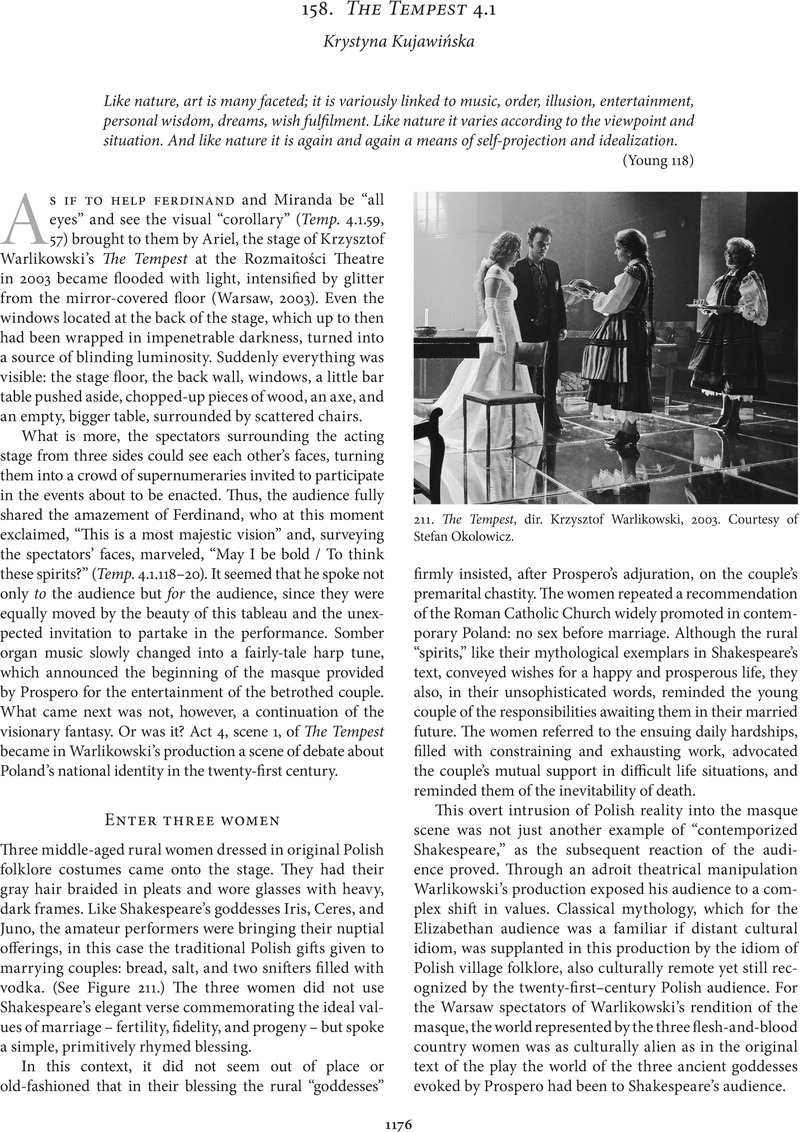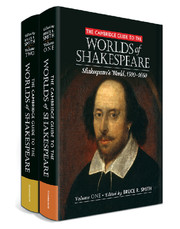Book contents
- The Cambridge Guide to the Worlds of Shakespeare
- Frontispiece
- Frontispiece
- The Cambridge Guide to the Worlds of Shakespeare
- Worlds of Shakespeare
- Copyright page
- Contents
- Illustrations
- Contributors
- Preface
- Acknowledgments
- Abbreviations
- Part I Mapping Shakespeare’s World
- Part II Theater
- Part III Language
- Part IV Science and Technology
- Part V Printing, Publishing, Textuality
- Part VI Visual Arts
- Part VII Popular Culture
- Part VIII High Culture
- Part IX England, 1560–1650
- Part X Religion
- Part XI Medicine
- Part XII The Historical William Shakespeare
- Part XIII Shakespeare’s Fellows
- Part XIV Shakespeare’s Early Reception (to 1660)
- Part XV International Encounters
- Part XVI Making the Scene
- Introduction
- 149 Romeo and Juliet 2.1: “But soft, what light through yonder window breaks?”
- 150 A Midsummer Night’s Dream 3.2: “Lord, what fools these mortals be!”
- 151 Henry V 3.1: “Once more unto the breach”
- 152 Hamlet 3.1: “To be or not to be”
- 153 Macbeth 1.3: “king hereafter!”
- 154 Othello 1.3: “far more fair than black”
- 155 Antony and Cleopatra: Interview with Harriet Walter
- 156 King Lear 5.3: “Never, never, never, never, never”
- 157 Richard III 5.4: “My kingdom for a horse!”
- 158 The Tempest 4.1
- Part XVII Shakespeare as Cultural Icon
- Part XVIII Shakespeare and Popular Culture
- Part XIX Translation
- Part XX Changing Technologies of Stage Performance
- Part XXI Audiences
- Part XXII Production History
- Part XXIII Printing and Reception History
- Part XXIV Shakespeare and the Book
- Part XXV Shakespeare and the Critics
- Part XXVI Shakespeare and the Performing Arts
- Part XXVII Shakespeare and the Visual Arts
- Part XXVIII Shakespeare and Media History
- Index
- References
158 - The Tempest 4.1
from Part XVI - Making the Scene
Published online by Cambridge University Press: 17 August 2019
- The Cambridge Guide to the Worlds of Shakespeare
- Frontispiece
- Frontispiece
- The Cambridge Guide to the Worlds of Shakespeare
- Worlds of Shakespeare
- Copyright page
- Contents
- Illustrations
- Contributors
- Preface
- Acknowledgments
- Abbreviations
- Part I Mapping Shakespeare’s World
- Part II Theater
- Part III Language
- Part IV Science and Technology
- Part V Printing, Publishing, Textuality
- Part VI Visual Arts
- Part VII Popular Culture
- Part VIII High Culture
- Part IX England, 1560–1650
- Part X Religion
- Part XI Medicine
- Part XII The Historical William Shakespeare
- Part XIII Shakespeare’s Fellows
- Part XIV Shakespeare’s Early Reception (to 1660)
- Part XV International Encounters
- Part XVI Making the Scene
- Introduction
- 149 Romeo and Juliet 2.1: “But soft, what light through yonder window breaks?”
- 150 A Midsummer Night’s Dream 3.2: “Lord, what fools these mortals be!”
- 151 Henry V 3.1: “Once more unto the breach”
- 152 Hamlet 3.1: “To be or not to be”
- 153 Macbeth 1.3: “king hereafter!”
- 154 Othello 1.3: “far more fair than black”
- 155 Antony and Cleopatra: Interview with Harriet Walter
- 156 King Lear 5.3: “Never, never, never, never, never”
- 157 Richard III 5.4: “My kingdom for a horse!”
- 158 The Tempest 4.1
- Part XVII Shakespeare as Cultural Icon
- Part XVIII Shakespeare and Popular Culture
- Part XIX Translation
- Part XX Changing Technologies of Stage Performance
- Part XXI Audiences
- Part XXII Production History
- Part XXIII Printing and Reception History
- Part XXIV Shakespeare and the Book
- Part XXV Shakespeare and the Critics
- Part XXVI Shakespeare and the Performing Arts
- Part XXVII Shakespeare and the Visual Arts
- Part XXVIII Shakespeare and Media History
- Index
- References
Summary

Keywords
- Type
- Chapter
- Information
- The Cambridge Guide to the Worlds of Shakespeare , pp. 1176 - 1182Publisher: Cambridge University PressPrint publication year: 2016

